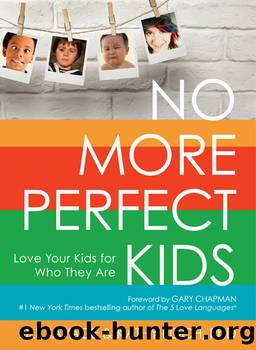No More Perfect Kids by Jill Savage

Author:Jill Savage [Savage, Jill; Koch, Kathy]
Language: eng
Format: epub
ISBN: 978-0-8024-9007-0
Publisher: Moody Publishers
Published: 2014-09-15T00:00:00+00:00
âDOINGâ LABELS
Many labels are earned because of what kids do. Thatâs understandable and can be positive. These include statements such as âI am an athlete.â Often kids will include a descriptive adjectiveââa good athlete.â In most cases, we give them those adjectives either in conversation as we introduce them to others or in the way we react to them. However, itâs important that we realize both ends of the spectrum when it comes to âdoing labelsââthat is, labels that are closely associated with what our kids do. One end of the spectrum motivates; the other end of the spectrum can end up in pride.
For instance, âIâm a star athleteâ can be positive, as it motivates kids to practice and listen carefully to their coaches so they maintain their excellence. But it can make teamwork challenging if the âstar athleteâ becomes prideful and sets himself up as better than his peers.
âIâm a terrible singerâ is obviously a negative way for your daughter to declare sheâs not singing well. You might help her realign her thinking by a comment such as, âYou may not be singing well at the moment, but that doesnât make you a terrible singer. We all have bad days, and we can use those to motivate us to keep practicing or work at a particular skill.â Her frustration can be positive if itâs short-lived and it motivates her to practice and work at a particular skill sheâs lacking. But the âIâm a terrible singerâ statement can be negative if it causes her to give up. Itâs also negative if she draws this conclusion just by comparing herself to the best singers in her choir.
Itâs best when âdoingâ identities are specific descriptions of behavior rather than general statements. For instance, it would be better for your daughter to know, âIâve got to figure out how to make my breaths last longer. And I know my director is right. I need to practice singing the scales.â Sheâs identifying specific skills to work on so she wonât feel âterribleâ anymore. Your son who thinks of himself as a âbad writerâ would be better off describing his specific goals: âI need to remember to proofread to add more adjectives to my essays to make my writing richer.â In this way his label becomes âIâm choosing to improve my writing.â
Not all good athletes are the same. When your kids know what makes them uniquely good, theyâll know how they can specifically help a team or help a less-skilled player. Theyâll also know what they werenât able to list as part of their skills that they could work on more. For instance, your son might be able to identify his talent in this way: âIâm better at football this year because I worked on speed and agility over the summer.â Your soccer-playing daughter might state, âIâm playing well this year because Iâm looking ahead better to predict where the defensive players are going.â Identity controls behavior.
Because identity controls behavior, youâll want your kids to have âdoing identitiesâ for the activities they value and for activities you want them to value.
Download
This site does not store any files on its server. We only index and link to content provided by other sites. Please contact the content providers to delete copyright contents if any and email us, we'll remove relevant links or contents immediately.
The 5 Love Languages: The Secret to Love That Lasts by Gary Chapman(9768)
The Space Between by Michelle L. Teichman(6921)
Assassin’s Fate by Robin Hobb(6192)
Wiseguy by Nicholas Pileggi(5762)
Everything Happens for a Reason by Kate Bowler(4729)
Gerald's Game by Stephen King(4631)
Pillow Thoughts by Courtney Peppernell(4268)
A Simplified Life by Emily Ley(4154)
The Power of Positive Thinking by Norman Vincent Peale(4050)
Harry Potter and the Prisoner of Azkaban (Book 3) by J. K. Rowling(3346)
Resisting Happiness by Matthew Kelly(3332)
Girl, Wash Your Face by Rachel Hollis(3273)
Being Aware of Being Aware by Rupert Spira(3264)
The Code Book by Simon Singh(3167)
The Secret Power of Speaking God's Word by Joyce Meyer(3154)
More Language of Letting Go: 366 New Daily Meditations by Melody Beattie(3017)
Real Sex by Lauren F. Winner(3002)
Name Book, The: Over 10,000 Names--Their Meanings, Origins, and Spiritual Significance by Astoria Dorothy(2967)
The Holy Spirit by Billy Graham(2938)
